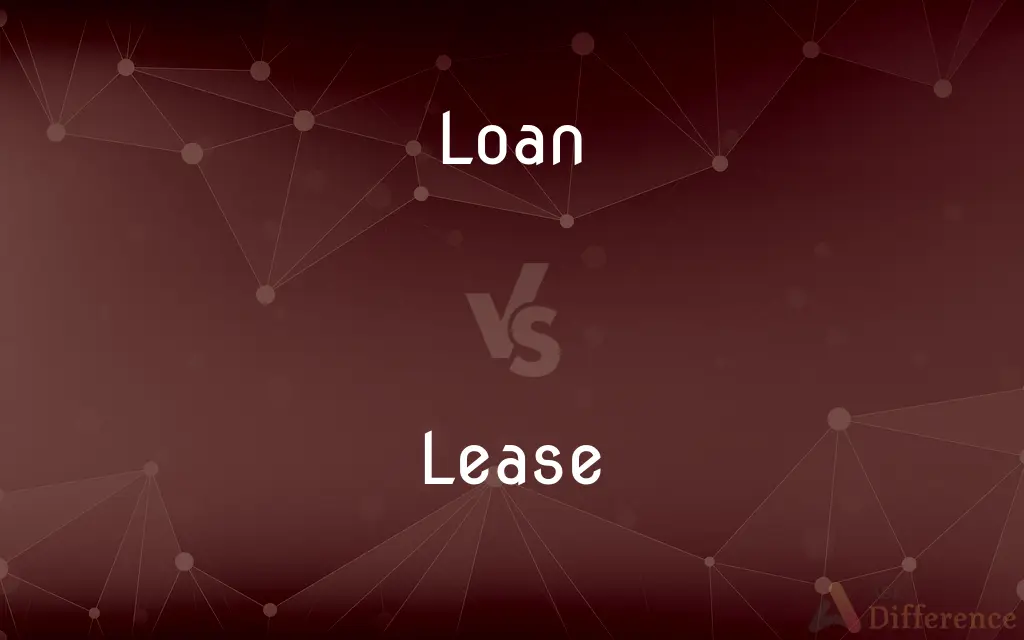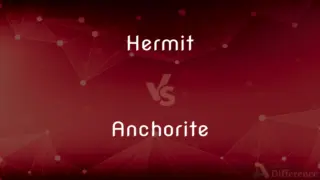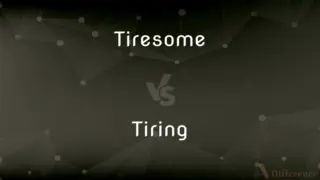Loan vs. Lease — What's the Difference?
By Maham Liaqat & Fiza Rafique — Updated on April 8, 2024
A loan involves borrowing money to be repaid with interest, while a lease is a contract to use an asset for a set period without ownership.

Difference Between Loan and Lease
Table of Contents
ADVERTISEMENT
Key Differences
A loan is a financial agreement where an individual or entity receives a sum of money upfront and commits to repaying it over time, along with interest. This repayment is usually in the form of monthly payments. On the other hand, a lease is a contractual agreement in which one party, the lessee, pays the lessor for the use of an asset for a predetermined period.
While loans are primarily used for acquiring money to purchase goods, consolidate debt, or cover expenses, leases are specific to the use of assets like vehicles, real estate, or equipment. The lessee pays for the right to use the asset but does not own it.
The interest rates in a loan determine the cost of borrowing and can vary based on creditworthiness, loan type, and market conditions. Whereas, in a lease, the payments may include interest or financing charges, but the focus is on the payment for the use of the asset rather than the cost of borrowing.
Collateral often secures loans, requiring the borrower to pledge an asset against the borrowed amount. In contrast, a lease does not typically require collateral in the same sense, but the leased asset itself may be repossessed if payments are not made.
At the end of a loan term, the borrower fully owns the asset purchased with the loan, assuming all payments have been made. However, at the end of a lease term, the lessee typically must return the asset, purchase it at a predetermined price, or enter a new lease agreement.
ADVERTISEMENT
Comparison Chart
Urpose
To borrow money for various needs.
To obtain the right to use an asset.
Ownership
Leads to ownership of the asset after repayment.
Does not lead to ownership; asset must be returned.
Payment
Involves repayment of principal and interest.
Involves periodic payments for the use of the asset.
Collateral
Often requires collateral.
Asset itself can be repossessed; no separate collateral.
Term End
Borrower owns the asset outright.
Lessee returns the asset, buys it, or renews the lease.
Compare with Definitions
Loan
A sum of money that is borrowed and expected to be paid back with interest.
She took out a loan to pay for her education.
Lease
A contract granting use or occupation of property during a specified period in exchange for rent.
They signed a lease for the apartment for one year.
Loan
Financial aid that accrues interest and must be repaid.
Federal student loans have lower interest rates.
Lease
The legal document outlining the terms of a rental agreement.
The lease specifies that no pets are allowed.
Loan
The act of lending money with the expectation of future repayment.
Offering a loan can be a risky investment.
Lease
A fixed-term arrangement where the lessee has the right to use an asset.
Their business model relies heavily on leasing commercial spaces.
Loan
A relationship established between a borrower and a lender.
Their loan required monthly payments over fifteen years.
Lease
An agreement where a lessee pays the lessor for the use of an asset.
The company leased new office equipment.
Loan
An agreement where a borrower receives money with the obligation to return it within a specified timeline.
The bank approved his loan application quickly.
Lease
The act of renting property, vehicles, or equipment.
Leasing a car can be more affordable than buying.
Loan
In finance, a loan is the lending of money by one or more individuals, organizations, or other entities to other individuals, organizations etc. The recipient (i.e., the borrower) incurs a debt and is usually liable to pay interest on that debt until it is repaid as well as to repay the principal amount borrowed.
Lease
A lease is a contractual arrangement calling for the lessee (user) to pay the lessor (owner) for use of an asset. Property, buildings and vehicles are common assets that are leased.
Loan
An instance of lending
A bank that makes loans to small businesses.
Lease
A contract by which one party conveys land, property, services, etc. to another for a specified time, usually in return for a periodic payment
A six-month lease on a shop
Loan
A sum of money that is lent, usually with an interest fee
Took out a loan to buy a car.
Repaid the loan over five years.
Lease
Grant (property) on lease; let
She leased the site to a local company
Loan
The agreement or contract specifying the terms and conditions of the repayment of such a sum.
Lease
A contract granting use or occupation of property during a specified period in exchange for a specified rent or other form of payment.
Loan
The repayment obligation associated with such an agreement
She couldn't afford the loan after losing her job.
Lease
The term or duration of such a contract.
Loan
The right to payment associated with such an agreement
A bank that buys consumer loans.
Lease
To grant use or occupation of under the terms of a contract.
Loan
The state of being lent for temporary use
A painting on loan from another museum.
Lease
To get or hold by such a contract.
Loan
To lend (money or property).
Lease
An interest in land granting exclusive use or occupation of real estate for a limited period; a leasehold.
Loan
An act or instance of lending, an act or instance of granting something for temporary use.
Because of the loan that John made to me, I was able to pay my tuition for the upcoming semester.
Lease
An interest granting exclusive use of any thing, such as a car or boat.
Loan
A sum of money or other property that a natural or legal person borrows from another with the condition that it be returned or repaid over time or at a later date (sometimes with interest).
All loans from the library, whether books or audio material, must be returned within two weeks.
He got a loan of five thousand pounds.
Lease
The contract or deed under which such an interest is granted.
Loan
The contract and array of legal or ethical obligations surrounding a loan.
He made a payment on his loan.
Lease
The document containing such a contract or deed.
Loan
The permission to borrow any item.
Thank you for the loan of your lawn mower.
Lease
The period of such an interest.
Loan
(Scotland) A lonnen.
Lease
An open pasture or common.
Loan
To lend (something) to (someone).
Lease
The place at which the warp-threads cross on a loom.
Loan
A loanin.
Lease
To grant a lease as a landlord; to let.
Loan
The act of lending; a lending; permission to use; as, the loan of a book, money, services.
Lease
To hold a lease as a tenant.
I'm leasing a small apartment in Runcorn for a month while I'm there for work.
Loan
That which one lends or borrows, especially a sum of money lent at interest; as, he repaid the loan.
Lease
(transitive) To gather.
Loan
To lend; - sometimes with out.
By way of location or loaning them out.
Lease
(transitive) To pick, select, pick out; to pick up.
Loan
The temporary provision of money (usually at interest)
Lease
(transitive) To glean.
Loan
A word borrowed from another language; e.g. `blitz' is a German word borrowed into modern English
Lease
(intransitive) To glean, gather up leavings.
Loan
Give temporarily; let have for a limited time;
I will lend you my car
Loan me some money
Lease
To tell lies; tell lies about; slander; calumniate.
Lease
To release; let go; unloose.
Lease
To gather what harvesters have left behind; to glean.
Lease
To grant to another by lease the possession of, as of lands, tenements, and hereditaments; to let; to demise; as, a landowner leases a farm to a tenant; - sometimes with out.
There were some [houses] that were leased out for three lives.
Lease
To hold under a lease; to take lease of; as, a tenant leases his land from the owner.
Lease
The temporary transfer of a possession to another person in return for a fee or other valuable consideration paid for the transfer;
Lease
The contract for such letting.
Lease
Any tenure by grant or permission; the time for which such a tenure holds good; allotted time.
Our high-placed MacbethShall live the lease of nature.
Lease
Property that is leased or rented out or let
Lease
A contract granting use or occupation of property during a specified time for a specified payment
Lease
The period of time during which a contract conveying property to a person is in effect
Lease
Let for money;
We rented our apartment to friends while we were abroad
Lease
Hold under a lease or rental agreement; of goods and services
Lease
Grant use or occupation of under a term of contract;
I am leasing my country estate to some foreigners
Lease
Engage for service under a term of contract;
We took an apartment on a quiet street
Let's rent a car
Shall we take a guide in Rome?
Common Curiosities
What is a lease?
A lease is a contract allowing one to use an asset for a set period in exchange for payment.
How do loans work?
Loans work by providing the borrower with money upfront, which is repaid over time with added interest.
What happens if you default on a loan?
Defaulting on a loan can lead to legal action, loss of collateral, and negative impacts on your credit score.
How do leases work?
Leases allow the lessee to use an asset for payments without transferring ownership.
Is it better to lease or loan a car?
It depends on your financial situation and whether you want to own the car or prefer a new one every few years.
Can you buy the asset at the end of a lease?
Yes, many leases offer the option to purchase the asset at the end of the lease term.
Are lease payments higher than loan payments?
Lease payments can be lower than loan payments because you're paying for the use of the asset, not its full value.
What happens if you break a lease?
Breaking a lease can result in financial penalties, legal action, and negative impacts on your credit report.
What is a loan?
A loan is a sum of money borrowed that must be paid back with interest.
What are the tax implications of loans vs. leases?
The tax implications vary; interest on some loans may be deductible, while lease payments can sometimes be written off as business expenses.
Do loans require collateral?
Many loans require collateral, but it depends on the loan type and the lender's requirements.
How does credit score affect loans and leases?
A higher credit score can secure lower interest rates on loans and better terms on leases.
Can I end a lease early?
It's possible, but there may be penalties for early termination of a lease.
What's the difference between an operating lease and a finance lease?
An operating lease is for a short period of the asset's life, whereas a finance lease covers a longer period and may lead to ownership.
Can I negotiate the terms of a loan or lease?
Yes, terms of loans and leases can sometimes be negotiated, especially the interest rate or lease duration.
Share Your Discovery

Previous Comparison
Hermit vs. Anchorite
Next Comparison
Tiresome vs. TiringAuthor Spotlight
Written by
Maham LiaqatCo-written by
Fiza RafiqueFiza Rafique is a skilled content writer at AskDifference.com, where she meticulously refines and enhances written pieces. Drawing from her vast editorial expertise, Fiza ensures clarity, accuracy, and precision in every article. Passionate about language, she continually seeks to elevate the quality of content for readers worldwide.
















































